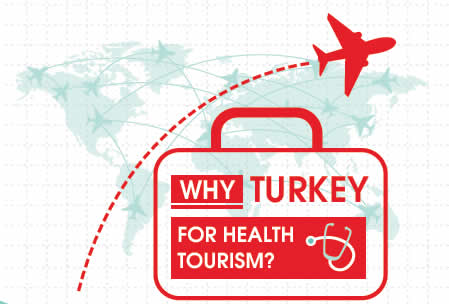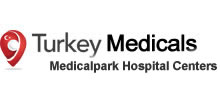
.
.
WHY DO HEALTH TOURISM VISITORS COMING TO TURKEY SPEND MORE?
In recent years, health tourism has become one of the most important sectors for countries around the world, and Turkey has increasingly emerged as a major player in this field. The allure of Turkey as a health tourism destination is undeniable, with foreign visitors spending significantly more than those traveling for leisure or business. On average, health tourists spend about ten times more than traditional tourists. This article delves into why health tourism visitors in Turkey contribute so much to the country’s economy, exploring the factors that drive their spending and how Turkey is capitalizing on this lucrative market.
A Booming Sector in Global Context
Health tourism, also known as medical tourism, includes a variety of services such as medical treatments, elderly and disabled tourism, as well as thermal tourism. Globally, the health tourism market is on a rapid growth trajectory. In 2023, it was estimated that the global market for health tourism was worth around $400 billion. Experts predict that this number will reach $600 billion in the next few years and could surpass $1 trillion by 2026. This growth presents a unique opportunity for countries like Turkey, which already have established health tourism infrastructures and are continuing to develop strategies to capture a larger share of the market.
Turkey, with its rich history of health and wellness, has emerged as a leading health tourism destination. The country already generates an annual revenue of approximately $12–13 billion from health tourism alone, and experts project that by 2023, this number will increase significantly, potentially surpassing $50 billion. With ambitious plans to reach $50 billion in revenue by 2030, Turkey is positioning itself as a key player in the global health tourism industry.
Why Health Tourists Spend More in Turkey
One of the most striking aspects of health tourism in Turkey is the amount of money foreign tourists spend compared to other types of travelers. Health tourists tend to spend much more on their visits, and there are several key factors contributing to this trend.
1- Affordable High-Quality Healthcare
One of the main reasons health tourists choose Turkey is the combination of high-quality medical services and affordable prices. Turkey has become known for offering world-class healthcare at a fraction of the cost of similar treatments in countries like the United States, Germany, Canada or the United Kingdom. Medical procedures, such as surgeries, dental care, and fertility treatments, are available at competitive rates that attract tourists from around the world.
Patients traveling to Turkey can access advanced medical technologies and expertise in a range of fields, including cosmetic surgery, ophthalmology, orthopedics, and oncology. The affordability of these services, when compared to prices in their home countries, makes Turkey an attractive option for health tourism. As a result, health tourists often opt for more comprehensive packages, including multiple treatments or extended stays, driving up their overall spending.
2- Luxury Medical Tourism Packages
Health tourism in Turkey is not just about receiving medical care; it’s also about offering a premium, luxury experience. Many Turkish health tourism providers offer all-inclusive packages that include transportation, accommodation, meals, and even post-treatment care. These packages often feature stays in five-star hotels or resort-like environments that combine relaxation with medical treatment, making the experience more appealing to affluent tourists.
Additionally, health tourists are often offered personalized services, such as private consultations with doctors, concierge services, and dedicated medical staff to ensure the best possible experience. This level of luxury and personalization results in higher spending by health tourists compared to those traveling for leisure or business, who typically spend less on accommodations and services during their stay.
3- Thermal Tourism and Wellness
Thermal tourism, one of the key segments of health tourism in Turkey, contributes significantly to the higher spending levels of health tourists. Turkey is home to numerous thermal springs, which have been used for therapeutic purposes for centuries. The healing properties of these natural springs, coupled with the country’s modern spa and wellness centers, attract tourists seeking relaxation and rehabilitation.
Visitors to thermal resorts in Turkey can take advantage of the therapeutic benefits of the hot springs while also enjoying luxurious spa treatments, massage therapies, and other wellness services. Many health tourists who visit Turkey for thermal tourism combine this with other medical treatments, creating a holistic approach to their health and wellness that increases their overall spending.
4- Elderly and Disabled Tourism
Another significant component of Turkey’s health tourism market is elderly and disabled tourism. Turkey has increasingly become a destination for elderly individuals or people with disabilities who require specialized care during their travels. The country offers both medical and non-medical services to cater to these visitors, including long-term care facilities, rehabilitation centers, and assisted living accommodations.
For many elderly and disabled tourists, staying in Turkey not only provides access to high-quality medical care, but also a chance to enjoy the country’s rich culture, scenic landscapes, and warm climate. With affordable long-term care options, family members can feel confident that their loved ones are receiving the necessary support and treatment while also enjoying a change of scenery. This niche segment of the market contributes to the higher spending habits of health tourists, as these visitors often require the more extensive care and longer stays.
5- Increasing International Recognition
Over the years, Turkey’s healthcare infrastructure has gained recognition internationally. The country boasts a large number of internationally accredited hospitals, medical institutions, and specialized clinics that adhere to global standards of healthcare. This credibility and trust have attracted an increasing number of health tourists from all over the world, particularly those from regions where the medical care is expensive or less advanced.
The growing international recognition of Turkish healthcare institutions has contributed to a rise in demand for services, which in turn drives higher spending by health tourists. As patients travel from countries with high medical costs, they are more likely to opt for additional tourism services and treatments, further boosting the economic impact of health tourism on the Turkish economy.
Turkey’s Strategy for Continued Growth
Looking ahead, Turkey aims to capitalize on the growing demand for health tourism by implementing strategies that will further enhance the country’s appeal as a medical destination. One key strategy is expanding and improving the infrastructure of health tourism services. This includes not only enhancing medical facilities but also investing in accommodations, transportation, and specialized healthcare services for international patients.
Another important strategy is marketing and promoting Turkey as a health tourism hub through international partnerships, targeted advertising, and increased online presence. As the number of health tourists visiting Turkey continues to grow, the country is likely to see even greater revenue generation from this sector.
.
Turkey Medicals, “Health tourism in Turkey is a rapidly growing sector with a significant economic impact. Foreign visitors who come to Turkey for health purposes spend much more than other tourists, and this trend is expected to continue as Turkey strengthens its position as a top destination for medical, elderly, and thermal tourism. The combination of affordable, high-quality healthcare, luxury medical tourism packages, and a growing reputation for excellence in healthcare are all factors that contribute to the higher spending of health tourists. With ambitious revenue targets for the future, Turkey is well on its way to becoming a global leader in top health tourism, further fueling its economy and attracting more international visitors in the years to come”, said Buket, International Patient Coordinator.
.
.
.
.
